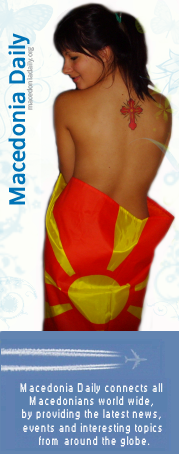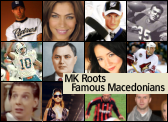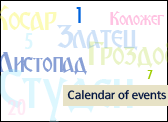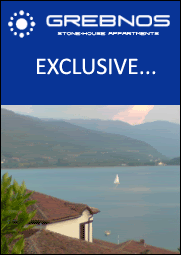IVANOV NEW MACEDONIAN PRESIDENT

National.
Macedonian voters elected Professor Gjorge Ivanov as their fourth president since the country declared independence in 1991. Supported by the ruling VRMO-DPMNE-led coalition, Ivanov won 437,470 votes, while SDSM candidate and fellow professor Ljubomir Frckovski -- ironically, a former co-author of Ivanov's -- took 252,195 votes, with nearly 97% of the ballots counted.
The first unofficial results for local elections showed the VMRO-DPMNE winning 31 mayoralties in the runoff (on top of 24 in the first round). The SDSM and two independent candidates it supported won nine, while the Democratic Union for Integration (DUI) emerged with eight. The opposition Democratic Party of Albanians (DPA) won the key city of Tetovo.
The VMRO-DPMNE took the mayoralty of the capital, Skopje. Huge electoral battles raged in several major cities like Ohrid, Centar, Resen and Struga, where new mayors' victory margins amounted to mere dozens of votes.
In his victory speech, Ivanov said his main priorities are NATO and EU integration and resolution of the "name issue with Greece", as quoted by Reuters.
The strong support for the VMRO-DPMNE "feels not like a victory but rather like the [creation of an] obligation towards all citizens", said party leader and Prime Minister Nikola Gruevski, who thanked outgoing President Branko Crvenkovski for co-operation "despite our disagreements". The VMRO-DPMNE congratulated voters for participating in fair, democratic and peaceful elections and emphasised they were crucial to NATO and EU integration.
Frckovski also congratulated the winners, while SDSM leader Zoran Zaev emphasised the VMRO-DPMNE now has absolute power but also absolute responsibility. The SDSM initially echoed the VMRO-DPMNE in praising the conduct of the elections. However, later in the night, it raised allegations of unfairness: electoral-list problems, intimidation and inappropriate use of UV lamps meant to prevent citizens from voting twice.
The 43% voter turnout is the lowest in Macedonia's history of presidential runoffs. International monitors from the OSCE/ODIHR expressed initial satisfaction with the calm elections but were still awaiting full reports from teams throughout the country.
One noticeable characteristic of the runoff was low turnout in Albanian-dominated areas, with relatively few voters making a presidential choice. An official of the DUI -- the ethnic-Albanian party within the ruling coalition -- said the party supported Ivanov but the decision lay with the voters.
Some experts said the absence of support by ethnic Albanians will be a serious handicap for Ivanov.
[SEtimes]


























Sts. Cyril and Methodius, Equal to the Apostles, Illuminators of the Slavs. 51
Greek Macedonia, or Macedonia Proper was destined to play a very important role in Christianity. The two Great sons of Macedonia, brothers Constantine (in schema Cyril) and Michael (in schema Methodius) provided education to the ignorant and uncivilized Slavs through religion and gave them an alphabet and codified their language, the Old Church Slavonic. The two Greek brothers from Thessaloniki, were the sons of Leon and Maria. Leon was a descendant of the Byzantine Empress, Irene the Athenian (797-802), wife of the Emperor Leon IV and was a drougarios, a senior official equal to a General, of the imperial administration. It is clear from Methodius’ biography that the two brothers were fluent Greek-speakers and educated in a Greek environment, and they grasped the Slavonic language easily. Cyril mastered a number of other languages, including Hebrew and Arabic according to his biographer and disciple, Clement.
There are a series of Papal affirmations regarding the birth and the nationality of the two brothers and their family. They are:
1. The Encyclical promulgated on 20 November 1901 (On the Foundation of a Seminary in Athens, Pope Leo XIII).
2. Apostolic Letter Pacis Nuntius(3) of 24 October 1964, proclaimed Saint Benedict Patron of Europe.
3. Egregiae Virtutis, by Pope John Paul II, December 31, 1980.
4. (Slavorum Apostoli Pope John Paul II, 2 June 1985).
5. Encyclical Epistle Grande Munus (30 September 1880), in Leonis XIII Pont. Max. Acta, II, PP. 125 137; cf. also PIUS XI, Letter Quod S. Cyrillum (13 February 1927) to the Archbishops and Bishops of the Kingdom of the Serbs-Croats-Slovenes and of the Czechoslovakian Republic: AAS 19 (1927), pp. 93-96; JOHN XXIII, Apostolic Letter Magnifici Eventus (11 May 1963) to the Prelates of the Slav Nations: AAS 55 (1963), pp. 434-439. PAUL VI, Apostolic Epistle Antiquae Nobilitatis (2 February 1969) for the eleventh centenary of the death of Saint Cyril: AAS 61 (1969), pp. 137-149).
6. UT UNUM SINT (That They May Be One) Pope John Paul II, 25 May 1995."
The Bulgarian Government considers the two brothers Greeks. 52 Professors Ivan Lazaroff, Plamen Pavloff, Ivan Tyutyundzijeff and Milko Palangurski of the Faculty of History of Sts. Cyril and Methodius University in Veliko Tŭrnovo, Bulgaria 53 , state very explicitly that the two brothers were Greeks from Thessaloniki. Oscar Halecki, 54 Professor of Eastern European History, agrees with the authors of Kratka istoriya na bŭlgarskiya narod. Moveover, Dr. Petar Djordjic states "Cyril and Methodius were Greeks," and speaking of Cyril he further states, "he studied in his native Thessaloniki." 55 Bulgarian Professors Vasil Gyuzelev, Konstantine Kosev, and Georgi Georgiev are of the same opinion. 56
It is very well known and documented that the father of Sts. Cyril and Methodius was Greek. 57 Nevertheless, there is a plethora of statements found in mostly Slavic websites and books written by Slavs offering a variety of statements about Maria’s nationality, from "it is said she was a Slav," to "she was probably a Slav," to "she was a Slav." Such statements are unsubstantiated assertions since none of these publications offers any Byzantine or other source of that period as their reference.
Proper names in the ancient Hellenic times were given based on ethnicity. Greeks received Greek names, Thracians received Thracian names, Illyrians received Illyrian names, etc. It was very important to people that they have names that meant something in their own language. In the Roman times, we see the phenomenon that Romans would receive Greek names and Greeks would receive Roman names. Upon the spread of Christianity, Greek or Hebrew proper names were given to the newly baptized. Thus the name Maria had to be given to her either at birth, which means she was a Greek, given the fact that the Slavs and the Bulgarians were not Christian yet, or she received her name Maria upon her baptism. However, there is no such evidence in any of the known creditable sources. The same is true for Michael and Constantine, later known as Methodius and Cyril respectively.
Posted by Anonymous |
22:43
Anonymous |
22:43
Resolution 817 (1993) 199
The Security Council,
• Having examined the application for admission to the United Nations in document S/25147,
• Noting that the applicant fulfils the criteria for membership in the United Nations laid down in Article 4 of the Charter,
• Noting however that a difference has arisen over the name of the State, which needs to be resolved in the interest of the maintenance of peaceful and good-neighbourly relations in the region,
• Welcoming the readiness of the Co-Chairmen of the Steering Committee of the International Conference on the Former Yugoslavia, at the request of the Secretary-General, to use their good offices to settle the above-mentioned difference, and to promote confidence-building measures among the parties,
• Taking note of the contents of the letters contained in documents S/25541, S/25542 and S/25543 received from the parties,
1. Urges the parties to continue to cooperate with the Co-Chairmen of the Steering Committee of the International Conference on the Former Yugoslavia in order to arrive at a speedy settlement of their difference;
2. Recommends to the General Assembly that the State whose application is contained in document S/25147 be admitted to membership in the United Nations, this State being provisionally referred to for all purposes within the United Nations as "the former Yugoslav Republic of Macedonia" pending settlement of the difference that has arisen over the name of the State;
3. Requests the Secretary-General to report to the Council on the outcome of the initiative taken by the Co-Chairmen of the Steering Committee of the International Conference on the Former Yugoslavia.
Posted by Anonymous |
22:55
Anonymous |
22:55
INTERVIEW WITH A CITIZEN OF THE FYROM
(name withheld for interviewee’s safety reasons)
(Because this interview was conducted by electronic means it has been left unedited)
-====================-
Interview
1. I want to thank you for accepting to participate in this interview. I understand you could be prosecuted under article 179 of the Penal Code. Could you please tell me about this law?
Thank you. The article 179 of the Criminal Code of FYROM forbids derogation of the i.e. “Republic of Macedonia” without no further definition of both the concept of the RM as well as the scope of acts which may be considered a derogation in a judicial process. There exists a loose possibility that I may be persecuted by the Office of Public Persecutor on the basis of the statement, but that did not actualized conclusive to this moment. I do consider this law, in light of my Libertarian political beliefs, a repressive one since it protects a contraction i.e. “RM” in a manner that any serious discourse about how that particular manifestation of statehood came into being may be potentially considered derogation per se, regardless of the value of the presented thesis and arguments.
2. Why are you giving this interview risking your education, future, even your freedom?
Because of my desire to challenge indolence and nihilism motivated by however human, nevertheless wrong frame of mind: conformism, in spite of gross transgression represented by the ideology of Pseudo-Macedonism, omnipresent in the social fabric and generator of much confusion, both within academia and in the fields of politics. In recent several years there is certain marked liberalism with regard to exercise of speech, but unlike societies where historical/ethnological discourse represent nothing more and nothing less than a legitimate topic pursued for the enrichment of truth, in FYROM it is still at minimum an eyebrow-rising topic.
Thus certain risk exist with regard to one safety and professional prosperity, but neither living in society overwhelmingly saturated by extremely elaborated lie is free and safe, nor professionalism exist where truthfulness, that sacrosanct principle is rejected in favour of conformism.
3. I understand that you had hard time finding a notary public to notarize a document. Please tell me about the document. Did you translate it all?
That is true; several notaries rejected my statement after giving a glance at the statement. It is likely they all of them were “ethnic Macedonians”. The reason for their rejection remains unknown to me; I can only guess that perhaps some of them did not want to relate themselves with such document. That stands in contrast with the FYROM legislative regulating notary work, which explicitly rejects notary's responsibility for the content of the statement, its accuracy or the lack thereof.
The statement was notarized in the office of an ethnic Albanian jurist, which lend plausibility to my theory that the “Macedonian” notaries were appalled by its content and haven't performed this service due to this fact.
There is no “judiciary authorized translation” of that statement, which would be only valid in domestic legal conditions. Only my translation of certain paragraphs exists.
4. What would you characterize as roots of instability in the FYROM?
The primary root of instability of FYROM lies in the desire, coupled with various form of might and strong social cohesion, of the ethnic Albanian element to secede from FYROM as a result of the aforementioned factors plus Balkan and macroglobal circumstances which allow such strategic projection by their leadership.
While extremely ravaging economic situation in FYROM (technological obsolescence, degraded basic infrastructure, high unemployment) are contributing factors to the general state of insecurity, even energetic palliative measures cannot override the ethnic instability.
The lack of genuine identity proliferated by the ideology of Pseudo-Macedonism is also a generator of tensions which official Skopje tends to project abroad.
5. I assume that in the Department of History of the University they teach you that the ancient Macedonians were not Greeks. What is it that made you think otherwise?
Your assumption is correct. The demagoguery that ancient Macedonians were not Greeks is strongly promoted at the University I attend. The entire curriculum about ancient Macedonia is carefully crafted in order to instil compliance. For example, publications by non-Balkan authorities are not allowed in the library of the aforementioned Department. ”Hammond” is a taboo name, as well as many other authors whose names students may dare to mention only if they polemically “challenge” their points. The only trend observable during recent years in local historiography is improved level of openness about the Bulgarian aspects of the past.
I had the privilege to have access to a much wider materials than most of my colleagues, having even before my academic studies began, serious doubts on the official version of the history which in its entirety is post-1992 fabrication loosely related to the post-1944 dogma. After exploring archaeological material, historiographic and paleo-ethnologic works regarding the ancient Macedonians, my picture of them was complete in sense that I had certain outlines of their genesis and ethnological features. At a latter stage it become evident that Macedonians after the defeat by Romans passed through variety of cultural evolutions which in light of some general trends predating the invasion of Slavs, consolidated them further within the wider Greek world, to which they belong with their inception.
Alternative theories like “Illyrian”, “Illyro-Thracian,” ”Pelasgian” have been discredited with arguments and cannot be longer held relevant. Ancient Macedonians represented a stock of people with all typological characteristics relevant for their categorization into the wider Hellenic world. Minor cultural syncretism, certain instance of historically attested apparent antagonisms with the rest of the Greece and several decontextualized sources do not undermine the authenticity of Macedonian's Hellenism.
6. How do the people of the FYROM feel about the Greek people?
In general, they consider the Greek state as foe No 1, as attacker on the sacrosanct character of their imagined identity, with rare attempt to give second thought to what are serious arguments from official Athens. There is no hostility in its direct form against Greek people and among many Slavs of FYROM there is a rational understanding that ethical, mutual based interests. Greece, regardless of the complicated administrative procedure, remains very popular tourist destination. But the genuine reconciliation, in my opinion, should come via broadening of cooperation, while the main problem: existence of pseudo-ethnic identity coupled with unjustified irredentism is a issue which awaits major internal social transformations, dictated both by academia and politics.
7. What name do you think would be appropriate for the FYROM?
“ Republika Vardar”/”Republic of Vardar”
The deficit, which is negligible, is that Axios/Vardar passes also through Northern Greece (Greek Macedonia). Also, it is somewhat reminiscent of “Vardarska Banovina,” briefly lasting subdivision of Royal Yugoslavia, a period disliked by many Slavs of FYROM.
The River Vardar, its very name, is a proverbial part of the local folklore and it is not only ethnically neutral, but a preferred way to call what many of them perceive as the “Liberated Macedonia”. Of course, the name Macedonia should not under any circumstances figure into the name of this state, not even with descriptive part of the name which would (in vain) distinguish from Greek Macedonia.
8. How do the people of the FYROM feel about the name of their country and their ethnicity?
The totalitarian system instilled into many people of older and mid-generation a cult of the state. That vestige of the communist past still follows its own path determined by inertia and popular negligence to radically challenge the dysfunctional habits and patterns of mentality. Therefore, what are natural feelings towards a name of one's own nation is augmented by the cult of the state in case of general population of FYROM. Their feelings, often expressed with marked affect when challenged by arguments are indicative of the lack of internal opposition to the Pseudo-Macedonism. The only individuals who act in according to reason are those who, mostly on private genealogical basis, opt for a draft-out from this fake ethnicity, by far most commonly by affiliation into Bulgarism. The only possible way to challenge the dogma of Pseudo-Macedonism is individual-based reconsideration of one's own identity which would provide person's true place in space and time. This, however, asks for initiative from inside and from the top. Regardless of what the dynamics of real political relationships in the Balkans brings, Pseudo-Macedonism may be defeated only by sound implementation of assertive academic stance. Only in this manner FYROM will cease to be a forgery-based bastion of totalitarianism.
9. Thank you very much for this interview and good luck with your studies.
You are welcome.
Posted by Anonymous |
23:04
Anonymous |
23:04
To Anonymous:
Poste your Greek copy/paste Propaganda elswhere you ATHENIAN TURKISH DICKHEAD!!!!
Posted by Theo |
11:46
Theo |
11:46
Dear MacMonkeys friends, these are official documents and not fairytales...
Read the documents and jump...
Posted by Anonymous |
23:28
Anonymous |
23:28
And eat your bananas... made in Macmonkeydonia...
Posted by Anonymous |
23:30
Anonymous |
23:30
HOW THE LIE WAS CREATED
Otecestven Vestnik (Sofia daily), 19 June 1991
STALIN TO BULGARIAN DELEGATION (G. Dimitrov, V. Kolarov, T. Kostov)
The Kremlin, 7 June 1946
Cultural autonomy must be granted to Pirin Macedonia within the framework of Bulgaria. Tito has shown
himself more flexible than you - possibly because he lives in a multiethnic state and has had to give equal
rights to the various peoples. Autonomy will be the first step towards the unification of Macedonia, but in
view of the present situation there should be no hurry on this matter. Otherwise, in the eyes of the Macedonian
people the whole mission of achieving Macedonian autonomy will remain with Tito and you will get the criticism.
You seem to be afraid of Kimon Georgiev, you have involved yourselves too much with him and do not want to
give autonomy to Pirin Macedonia. That a Macedonian consciousness has not yet developed among the population
is of no account. No such consciousness existed in Belarus either when we proclaimed it a Soviet Republic.
However, later it was shown that Belarusian people did in fact exist. ...
Posted by Anonymous |
22:43
Anonymous |
22:43
MACEDONIA IS 4 THE MACEDONIANS
ALEXANDER THE GREAT IS MACEDONIAN
PHILLIP IS FROM MACEDONIA
THE 16 RAY SUN IS MACEDONIAN
MACEDONIA IS NOT GREEK
MACEDONIA WAS NEVER PART OF GREEK HISTORY
MACEDONIA IS 1 OF THE OLDEST NAMES IN HISTORY
THE WORD GREEK OR GREECE OR GREKOMANI OR HELLENIC NEVER EXISTED IN ALEXANDER THE GREATS TIME.
THE WORD GREECE AND THE GREEK STATE AND FLAG WHERE CREATED IN 1830s
The 16 Ray Star Burst is not part of Greece History.
Cleopatra is Macedonian she is no Greek.
the word Macedonia means Tall
True Macedonians are the Vlahs and the Slavs. the Vlah people are like the aborigionals in Australia we are first.
Alexander the Greats Empire was called the Macedonian Empire not Greek.
MACEDONIA IS IN THE BIBLE
LOOK AT ANCIENT MAPS GREECE OR GREEK OR HELLENIC IS NOT WRITTEN OR PUBLISHED IN ANY OLD MAP. BUT THE WORD MACEDONIA IS.
Posted by Anonymous |
02:35
Anonymous |
02:35
Post a Comment